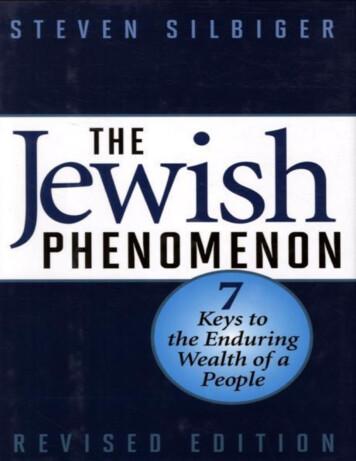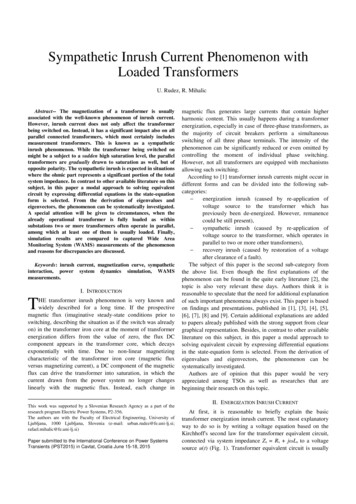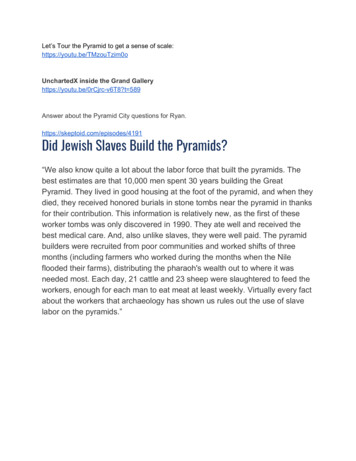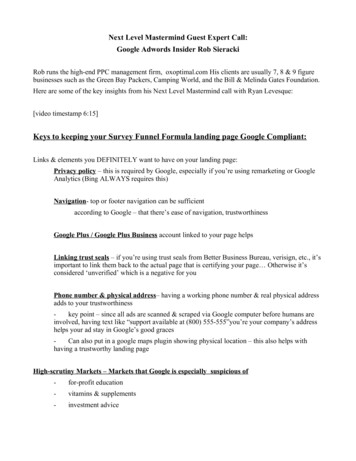
Transcription
Seven Keys to the Enduring Wealth of a PeopleRevised EditionSteven Silbiger
Acknowledgments ixIntroduction 1I Understand That Real Wealth Is Portable; It's Knowledge 212 Take Care of Your Own and They Will Take Care of You 353 Successful People Are Professionals and Entrepreneurs 534 Develop Your Verbal Confidence 875 Be Selectively Extravagant but Prudently Frugal 1076 Celebrate Individuality: Encourage Creativity 1277 Have Something to Prove: A Drive to Succeed 157Appendix 1: Yiddish: "Can't Spell It, Can't Pronounce It, and Don't Get it" 175Appendix 2: Hebrew: Fifty Helpful Vocabulary Words 191Appendix 3: Ten Yiddish Proverbs 195Appendix 4: The Jewish Calendar and Jewish Holidays 197Notes 201Humor Sources 209Index 211
Ywould like to thank John Yow, my editor at Longstreet Press, who immediately saw the potential ofthe project and made invaluable contributions to the book. I would also like to thank my editors whoprovided me a greater sensitivity and perspective: John Braun, Helen Gioulis and Rachel Silbiger,my mom.Comments, questions? E-mail the author at Jewish75@juno.com.
JJteven Spielberg. Ralph Lauren. Sergey Brin. Michael Dell. They're all successful, at the top of theirfields. They're all fabulously wealthy. And they're all Jewish. Those three characteristics-successful,wealthy and Jewish-are linked repeatedly in America today. And it is no accident. Jewish Americansare, as a group, the wealthiest ethnic group in America. But the factors that work together to createJewish wealth, which I identify in this book, can be applied to individuals and groups from anybackground.When this book was originally written both The Millionaire Next Door and The Gifts of the Jewsshared the Neu, York Times best-seller lists. But despite this obvious interest in wealth, on one hand,and the Jewish people, on the other, the two subjects have not been dealt with together. The Gifts ofthe Jews confines its discussion to the contributions that Judaism has made to American culture,including monotheism, the Ten Commandments and the Sabbath. But what largely defines Jews in thepopular imagination is their economic success and the accomplishments that made it possible.Perhaps Jews and their wealth have not become a focus for discussion because whenever Americansdiscuss ethnicity and money, the conversation tends to become heated. It does not have to be that way.The extraordinary story of Jewish-American success contains lessons for all of us.Many authors have written books about business success, trying to find a pattern that we can applyto all business organizations. What makes a company successful? Disney, Coca-Cola, Procter &Gamble, Google . how have they overcome challenges and become so successful? In examining thephenomenon of Jewish-American success, this book reveals the principles that can be applied to yourlife. And it is important to note that the wealth created by Jews is much more than just money; itincludes advances in the arts, sciences and humanities that made the money possible.A recent Los Angeles Times article describes the gap that The Jewish Phenomenon bridges. "Theeasy temptation is just to offer a laundry list of Jews and their achievements-a Hall of Fame of NobelPrize winners, musicians and artists, a parade of business leaders, movie moguls, educators,journalists and entertainers who have influenced the American scene. Yet in searching for a deeperanswer to the question-a theory that might explain the contributions of people as diverse as HowardStern and Albert Einstein-there's a silence in the literature about Judaism and American life." Theseven "keys" described in this book bring the silence to an end.About half of American Jews marry gentiles, prompting experts to project that the JewishAmerican community will shrink to half its size by 2050. This statistic lends urgency to theinvestigation of Jewish success today. As Rabbi David Wolpe of Sinai Temple, the oldestConservative Jewish congregation in Los Angeles, explained to the writer for the Los Angeles Times,"The farther away you get from the source of your tradition, the less of a contribution you might beexpected to make in a place like America. We could lose something precious."The Bell Curve, published with a storm of controversy in 1994, went down a slippery slope byexamining the genetic IQ component of the success ofJews and other groups-an approach that
alienated Jews and Gentiles alike. During the debate over The Bell Curve, the Union of AmericanHebrew Congregations rightly stated, "As Jews, we know too well how these theories have beenused against us . to justify hatred, discrimination, even murder and genocide."' The Bell Curve'ssharp rhetoric and dense statistics serve no useful purpose for two reasons: the science does not passcritical review, and there would be nothing to be learned if success lay in our genetic code at birth.The Jewish Phenomenon takes a positive position, that the Jewish people have been successfulbecause of a combination of factors related to the Jewish religion and culture, and a collectivehistorical experience. These are things that everyone and any group can examine and learn from.Anti-Semitism has a long history, and it is by no means dead. Throughout that long history, theJews' success has been decried as the reason for other people's problems. Even President RichardNixon, in his Watergate paranoia, saw the Jews as his enemies. In the famed "Nixon BasementTapes," Nixon told chief of staff H. R. Haldeman, "What about the rich Jews? The IRS is full of Jews,Bob. Go after 'em like a son-of-a-bitch! "While institutional antiSemitism has been virtuallyeliminated in America, on a personal level antiSemitism is very much alive.Today an isolated anti-Semitic act such as the painting of a Nazi swastika on a synagogue makesfront-page news and clergy from all denominations condemn it. The random shooting of three childrenby a madman at a Jewish community center in Los Angeles in 1999 brought worldwide outrage. Butjust seventy-five years ago Henry Ford, "Mr. Model T," conducted a propaganda campaign againstthe "International Jew." Ford believed that the Jews were involved in an international conspiracy toundermine the world economy. He spent millions of dollars investigating and publicizing hissuspicions, but he could never uncover any evidence of the twisted plot.Indeed, even today many Jewish people and the press would rather reserve the subject of theirsuccess for private conversations rather than fuel the fires of anti-Semitism.The Bernie Madoff fraudin 2008 showed this when an open discussion of Jewish wealth in America was avoided. OlderJewish Americans, in particular, have downplayed their success and their Judaism in an effort toavoid unwanted attention and possible trouble. But in recent years the Jewish community has becomeless reluctant to trumpet its accomplishments. In Schmoozing: The Private Conversations of AmericanJews, younger American Jews expressed the opinion that "we debase ourselves when we hide ourachievements out of fear of what the gentiles will think"' In December 1996, the Jewish magazineMoment published a cover story about the Jewish billionaires of the Forbes 400.; Such an articlewould have been unthinkable a few years before, and even today such reporting draws criticism. Inany case, Jews remain much more defensive than the facts warrant. In fact this book's first edition wasmet with great hostility in the Jewish community and the politically correct press. A recent study byDaniel Yankelovich and his staff revealed that 25 percent of Americans believe Jews have too muchpower in American business. But 75 percent of Jews think that others think Jews have too muchpower.'The wildly successful The Millionaire Next Door concentrated on the factors common to Americanmillionaires. That fascinating book actually inspired me to write this one because it began adiscussion of wealth in America, but did not finish it. Conspicuously absent was any mention ofreligion or ethnicity. However, The Millionaire did list "The Top 15 Economically Productive SmallGroups." Ranked No. I were Israeli Americans with a productivity index of 6.8.' Those Jewish
immigrants from Israel were seven times more likely to have the highest concentration of higherincomes and the lowest rate of dependency on public assistance than any other group studied. But thatwas all the book said. As I continued to thumb through the book, I thought that someone should take acloser look.That closer look revealed a picture of a very small group with a great deal of economic and socialsuccess. Of course, that was no surprise to me. My parents raised me as a Jew with expectations ofeconomic achievement, education and success. In addition, I had no shortage of role models from myfamily, my community, the media and the world. Economic success was the norm in my Jewishcommunity.Did I buy into a stereotype perpetuated out of ethnic pride, or was there a truth to it? Being criticalby nature, I quickly uncovered some compelling facts that prove Jewish success is indeed a fact inAmerica: The percentage of Jewish households with income greater than 50,000 is double that of On the other hand, the percentage of Jewish households with income less than 20,000 is halfthat of non-Jews. 7 "The Jewish advantage in economic status persists to the present day; it remains higher thanthat of white Protestants and Catholics, even among households of similar age, composition andlocation." Forty percent of the top 40 of the Forbes 400 richest Americans are Jewish. "One-third of American multimillionaires are tallied as Jewish."' Twenty percent of professors at leading universities are Jewish. Forty percent of partners in the leading law firms in New York and Washington are Jewish. "' Thirty percent of American Nobel Prize winners in science and 25 percent of all AmericanNobel winners are Jewish."It didn't end there. In his book Ethnic America, Dr. Thomas Sowell, an African-Americaneconomist and senior fellow at the Hoover Institute, created a point-scale index that graphed Jewisheconomic success compared with that of other ethnic groups.12THE JEWISH POPULATION IS SURPRISINGLY SMALLThe facts are extraordinary considering that Jewish Americans make up just 2 percent of the U.S.population, about 6 million of America's 300 million people. The high media visibility of successfulJews in the sciences, arts, media and business gives the false impression that the Jewish population isfar larger than it is. Only in New York and New Jersey do Jews make up more than 5 percent of thestate's population, and five states contain 65 percent of the Jewish-American population. At thebottom, there are only five hundred Jews in Idaho and five hundred in Wyoming, not enough to
support a decent delicatessen.Table I.1 Ethnic Household Income (U.S. Average 100)Table 1.2 Jewish Population of the United StatesSource: American Jewish Year Book, 2007.Table 1.3 Jewish Population of the World (countries over 50,000 listed)
Source: World Jewish Congress, 2008In the world of 6 billion people, there are only 13 million Jews, only onefifth of 1 percent. Exceptfor Israel, Jews are a tiny minority in every country. Jews live all over the world, but 91 percent ofthem live in just two countries.The former Soviet Union once contained more than a million Jews,who now live in many newly independent nations. Tahiti and Iraq have only 120 Jews each.Even when it comes to the Jewish presence in any individual city, Jews are small in percentage ofthe population. Only a handful of cities outside Israel have a Jewish population of any significantsize. New York and Miami have the largest percentage of Jews.Beyond being a small part of the American melting pot, Jewish Americans are relatively newarrivals. In many cases, Jews earned their American success in only one or two generations in the latenineteenth and twentieth centuries. For more than forty years the Jewish-American population'sgrowth has been slightly declining, and Jews have become an ever-decreasing percentage of the totalU.S. population.t3 The Natural Jewish Population Survey is done every ten years and each time thecount is hotly debated by statisticians as the definition of being Jewish is not universally agreed upon.DISCOVERING THE KEYSNo doubt about it, the statistics of Jewish success-especially given the relatively small Jewishpopulation-are remarkable. Of course, there are always individual exceptions to a general rule, justas individuals will vary within any group. However, when we view the complete picture, we see abig Jewish difference, and there must be some reasons for it. That is what The Jewish Phenomenon isall about. What secrets to success have the Jews learned that can apply to any life, any family and anycommunity?Table 1.4 Metropolitan Areas with the Largest Jewish Populations outside Israel (cities over 100,000listed)Source: World Jewish Congress, 2007Table 1.5 American Jewish Population, 1790-2000
Source. A History of the Jews in America, A. Karp, 1997 (NIPS 1990, 2000)The research held the answer. A wealth of literature and data that chronicles the lives of Jewishpeople throughout the ages provides the clues. Countless individual Jewish success stories led me tothe discovery of seven core values or beliefs that lay at the heart of Jewish achievement. In variouscombinations, these secrets have contributed significantly to the economic success of the Jewishpeople.The Seven Keys to Jewish Success1. Understand that real wealth is portable; it's knowledge2. Take care of your own and they will take care of you3. Successful people are professionals and entrepreneurs4. Develop your verbal confidence5. Be selectively extravagant but prudently frugal6. Take pride in individuality: encourage creativity7. Be psychologically driven to prove somethingAppreciating the KeysListing them is not enough. Each has its ro
When this book was originally written both The Millionaire Next Door and The Gifts of the Jews shared the Neu, York Times best-seller lists. But despite this obvious interest in wealth, on one hand, and the Jewish people, on the other, the two subjects have not been dealt with together. The Gifts of the Jews confines its discussion to the contributions that Judaism has made to American culture .











